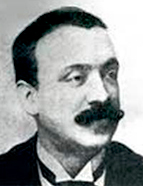

In História de Portugal, he presented the idea that the Portuguese institutions, leaders and people were in decay. In a succession of chronologically ordered episodes, this work presented a mixture of facts and omens, the former taken from a wide array of information sources (official speeches and decrees, manifestos, proclamations, press reports, etc.). Even though he argued that "for the historian, the personal sympathy or antipathy that figures may deserve (...) must be set aside in order to give way only to an impartial, serious, upright and honest criticism" ( Idem pp. 7-8), the author could not avoid frequent moralising judgements.
The author of a secular, anti-militarist, liberal and nationalist narrative, he was part of a Lisbon elite of civil servants and journalists who worked several textual genres. An astute observer of the city — "Lisbonland", "the capital of the country of fly eaters" ( Os Selvagens do Ocidente [The Savages of the West], p. 8), he set foot on the terrain of politicians and decision-makers, choir boys, actors and common thieves, against the backdrop of a poor and illiterate crowd, around whom — through the "mists of an unheard of savagery where murder, rape, drunkenness, personal political revenge, boorish and reactionary clericalism, and pilgrimages to various oracles of silly invocation" ( Idem p. 8) — 19 years of King Carlos' reign had elapsed.
Active bibliography : Sinopse dos homens célebres de Portugal desde a fundação da Monarquia , Lisboa, Tipografia de João Carlos d’Ascensão Almeida, 1883; “A espera dos touros (Lisboa Contemporânea)”. A Ilustração Portuguesa. Revista Literária e Artística . Lisboa, Ano I, n.º 49, 1 junho 1885, pp.7-8; “Tipos de Lisboa. O Martinho de Arroios”. A Ilustração Portuguesa. Revista Literária e Artística . Lisboa, Ano III, n.º 16, 1 novembro 1886, pp.8-10; Os Selvagens do Ocidente , Lisboa, Imprensa de Lucas Evangelista Torres, 1890; “A Kermesse (Divagações filosóficas)”. Nova Alvorada: Revista Mensal Literária e Científica . Vila Nova de Famalicão, n.º 2, 1 maio 1892, pp. 121-122; “Crónica”, O Branco e Negro. Revista Semanal Ilustrada para Portugal e Brasil . Lisboa, n.º4, 29 abril 1899, não paginado; Série Tuberculose Social (1. Chibos , Lisboa, Livraria Central, 1901; 2. Os predestinados , Lisboa, Livraria Central, 1901; 3. Mulheres perdidas , Lisboa, Livraria Central, 1902; 4. Os decadentes , Lisboa, Livraria Central, 1902; 5. Malucos? , Lisboa, Livraria Central, 1902; 6. Os políticos , Lisboa, Livraria Central, 1902; 7. Sáficas , Lisboa, Livraria Central, 1902; 8. A taberna , Lisboa, Livraria Central, 1903; 9. Casa de hóspedes , Lisboa, Livraria Central, 1903; 10. A Sacristia , Lisboa, Livraria Central, 1903; 11. Mulheres honestas , Lisboa, Livraria Central, 1903; 12. Os pelintras , Lisboa, Livraria Central, 1904); A burla do constitucionalismo: autópsia à política portuguesa no atual momento histórico. A pantomima, os pantomineiros e as pantominices do nosso mundo político , Lisboa, Parceria António Maria Pereira, 1905; História de Portugal (complemento). Um reinado trágico. Edição popular e ilustrada . 2 Vols. Lisboa, Empresa da História de Portugal/Livraria Moderna, 1908-1909. “Trechos escolhidos”. O Fluminense . Rio de Janeiro, n.º 10028, 16 outubro 1916, p.1.
This work is financed by national funds through FCT - Foundation for Science and Technology, I.P, in the scope of the projects UIDB/04311/2020 and UIDP/04311/2020.
